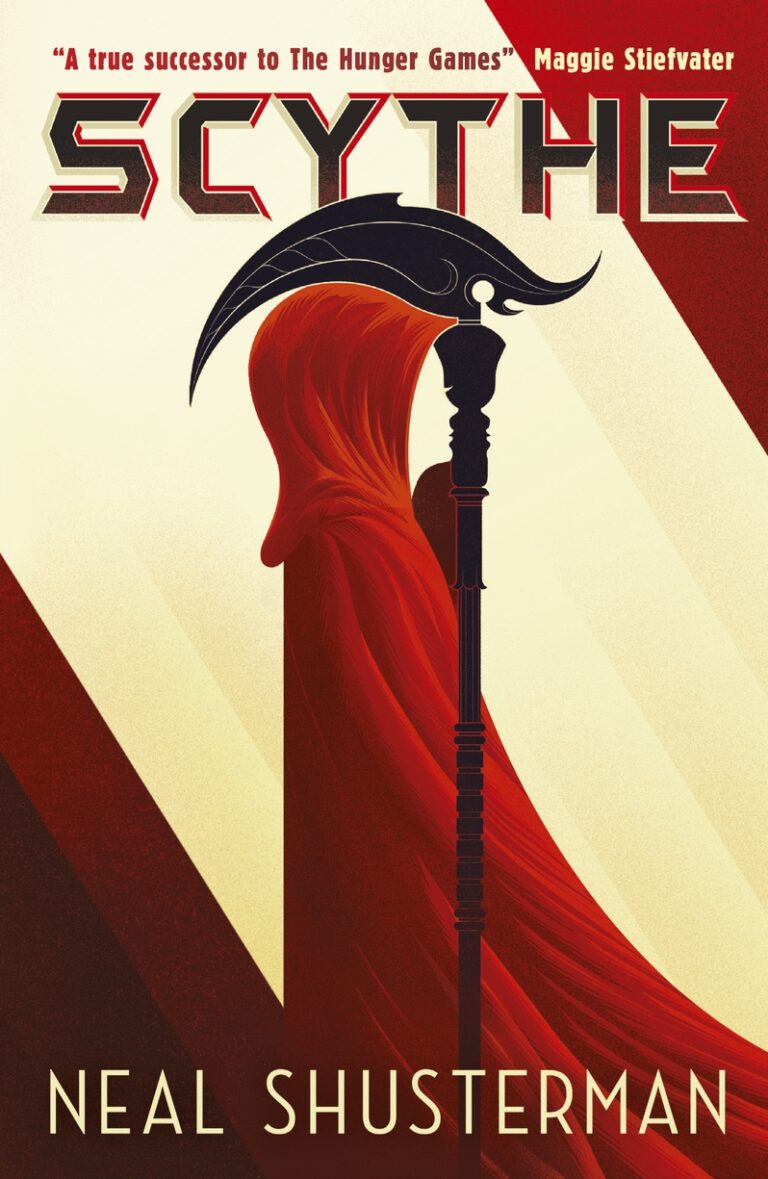Scythe by Neal Shusterman
Resource Key
When accessing content use the numbers below to guide you
 LEVEL 1
LEVEL 1
Brief, basic information laid out in an easy-to-read format. May use informal language. (Includes most news articles)
 LEVEL 2
LEVEL 2
Provides additional background information and further reading. Introduces some subject-specific language
 LEVEL 3
LEVEL 3
Lengthy, detailed information. Frequently uses technical/subject-specific language. (Includes most analytical articles)
Main Themes
Mortality and death
Power and corruption
Ethics and morality
Identity and purpose
Societal control
Human nature and empathy
Science Fiction

Science fiction, abbreviation SF or sci-fi, a form of fiction that deals principally with the impact of actual or imagined science upon society or individuals.
The customary “theatrics” of science fiction include prophetic warnings, utopian aspirations, elaborate scenarios for entirely imaginary worlds, titanic disasters, strange voyages, and political agitation of many extremist flavours, presented in the form of sermons, meditations, satires, allegories, and parodies—exhibiting every conceivable attitude toward the process of techno-social change, from cynical despair to cosmic bliss.
Science fiction writers often seek out new scientific and technical developments in order to prognosticate freely the techno-social changes that will shock the readers’ sense of cultural propriety and expand their consciousness.
- Encyclopædia Britannica. (n.d.). Science fiction. Britannica School. Retrieved June 29, 2023, from https://school.eb.com.au/levels/high/article/science-fiction/66289
Other Dystopian Explanations
Characteristics of Dystopian Stories

Many dystopias share similar characteristics, including:
- Economic challenges: There’s widespread poverty that the citizens must endure, or there are massive gaps in wealth that create a ruling class of elites and relegate everyone else to a life of scarcity and hardship.
- Environmental damage: Environmental devastation wreaks havoc on the lives and fates of the characters. This destruction might take the form of major weather events, like earthquakes or floods; climate change and its disastrous effects; or the ramifications of pollution, overpopulation, or disregard for the planet and its finite resources.
- Government influence: Typically, there’s either no government overseeing law, order, and civilization, or there’s a domineering government that operates a police state and controls and monitors the lives of all citizens.
- Loss of freedom or individual identity: A dystopian society often robs its citizens of their basic freedoms and/or individualism. It reduces them to sheep who must blindly follow the dictates of a tyrannical and unjust system.
- Propaganda: The existing power structure in a dystopia produces propaganda to keep the citizenry in line. Such propaganda might present a deceptive “everything is fine“ picture of life in order to control the population, or it might incite fear and terror and, thus, generate an excuse to engage in further domination and subjugation.
- Survival: The characters in a dystopian setting are in a fight to survive the oppressive conditions in which they find themselves. They must resort to extreme measures to protect themselves and those around them, which usually means rebelling against the powers that be.
- Technology: Advancements in technology tend to play a key role in controlling or tracking the citizens of a dystopia. Rather than solving problems, technology creates them—damaging relationships, reinforcing hierarchies and power structures, and reducing quality of life.
Dystopia in Literature: Definition & Examples | SuperSummary
Dystopia in Literature: Definition & Examples | SuperSummary. (n.d.). SuperSummary. Retrieved May 26, 2023 from https://www.supersummary.com/dystopia-in-literatur e-definition-examples/
Introduction
This guide has been created for year 10 students who are doing a close study of the novel "Scythe" by Neal Shusterman
Goodreads Overview
Scythe
Goodreads Choice Award
Nominee for Best Young Adult Fantasy & Science Fiction (2017)
Thou shalt kill.
A world with no hunger, no disease, no war, no misery. Humanity has conquered all those things, and has even conquered death. Now scythes are the only ones who can end life—and they are commanded to do so, in order to keep the size of the population under control.
Citra and Rowan are chosen to apprentice to a scythe—a role that neither wants. These teens must master the “art” of taking life, knowing that the consequence of failure could mean losing their own.
Scythe (Arc of a Scythe, #1) by Neal Shusterman | Goodreads
Speculative Fiction
What Is Speculative Fiction?
Speculative fiction is a broad term used to describe any story that explores the consequences of a change to our world by asking the reader "What if...?". This allows writers to expand upon current trends and speculate the transformation of the world as a result of that change.
Here is an article that provides an overview of what speculative fiction is: What is Speculative Fiction? | Celadon Books

Speculative fiction is a literary “super genre,” which encompasses a number of different genres of fiction, each with speculative elements that are based on conjecture and do not exist in the real world. Sometimes called “what-if” books, speculative literature changes the laws of what’s real or possible as we know them in our current society, and then speculates on the outcome.
- What Is Speculative Fiction? Defining and Understanding the Different Genres of Speculative Fiction - 2023 - MasterClass. (n.d.). Retrieved July 14, 2023 from https://www.masterclass.com/articles/what-is-speculative-fiction-defining-and-understanding-the-different-genres-of-speculative-fiction

The term “speculative fiction” has three historically located meanings: a subgenre of science fiction that deals with human rather than technological problems, a genre distinct from and opposite to science fiction in its exclusive focus on possible futures, and a super category for all genres that deliberately depart from imitating “consensus reality” of everyday experience.
Speculative Fiction | Oxford Research Encyclopedia of Literature
- Oziewicz, M. (2017). Speculative Fiction | Oxford Research Encyclopedia of Literature. Oxford Research Encyclopedia of Literature. Retrieved July 14, 2023 from https://oxfordre.com/literature/display/10.1093/acrefore/9780190201098.001.0001/acrefore-9780190201098-e-78;jsessionid=01659238FA7DE5D28AEE0EE259F06374


Science Fiction Videos


Dystopias

The dystopian genre of literature relates to stories of an unjust society in which the quality of life suffers as a result of destitution, oppression, or terror. Though these stories normally take place in the future, they are often reflective of contemporary social trends taken to an extreme. The term dystopia was created in direct response to the idea of utopia, which describes an ideal society of peace, harmony, and equality. In some dystopian literature, writers present an apparently utopian setting only to reveal it as secretly dystopian. Dystopian writing is often used in science fiction—many tales involve scientific or technological developments—and by extension speculative fiction, which encompasses all fiction dealing with fantastical and futuristic elements. Dystopian writers often insert themes of politics and religion, usually meant as commentary on real-life historical events. Parallels to contemporary society often contain warnings of tragic consequences. Recurrently, dystopian fiction usually involves an undesirable future brought on by humanity itself.
https://link.gale.com/apps/doc/CNVDFG049420542/SUIC?u=61_alls&sid=bookmark-SUIC&xid=e9e005f8
Dystopian Literature. (2014). In Gale In Context Online Collection. Gale. https://link.gale.com/apps/doc/CNVDFG049420542/SUIC?u=61_alls&sid=bookmark-SUIC&xid=e9e005f8
Dystopia Videos


Library Links
-
Scythe by
Call Number: F SHU BK1ISBN: 9781406379242Publication Date: 2018A world with no hunger, no disease, no war, no misery: humanity has conquered all those things, and has even conquered death. Now Scythes are the only ones who can end life and they are commanded to do so, in order to keep the size of the population under control. Citra and Rowan are chosen to apprentice to a scythe -- a role that neither wants. These teens must master the art of taking life, knowing that the consequence of failure could mean losing their own. (Books in Print) -
Publisher Link
Coming of Age Novel
Coming of age novel:
Bildungsroman is the combination of two German words: Bildung, meaning "education," and Roman, meaning "novel." Fittingly, a "bildungsroman" is a novel that deals with the formative years of the main character - in particular, his or her psychological development and moral education. The bildungsroman usually ends on a positive note with the hero's foolish mistakes and painful disappointments over and a life of usefulness ahead.
Characteristics include:
- A search for meaning by the protagonist, who is usually foolish and inexperienced at the beginning of the narrative. The story typically centers on the maturation process of a single person.
- Some kind of inciting incident that pushes the protagonist into their journey. It's usually something akin to a great emotional loss, like the death of a parent.
- The journey will not be easy. In fact, there will be many failures along the way. The hero will be tested, and he will fight tooth and nail to survive the unwavering rules and limits of society.
- Usually an epiphany, or a flashing moment where the hero finally 'gets it.' This lucidity changes them as a person. They learn what it takes to be a grown up in the real world.
- The hero will eventually find his place in society by accepting its values and rules. The ending isn't necessarily about closure. We often do not know exactly what's going to happen to the hero. We do know that he has grown as a person from page one, and at the very least he is equipped with the maturity and knowledge to have a chance in life.



